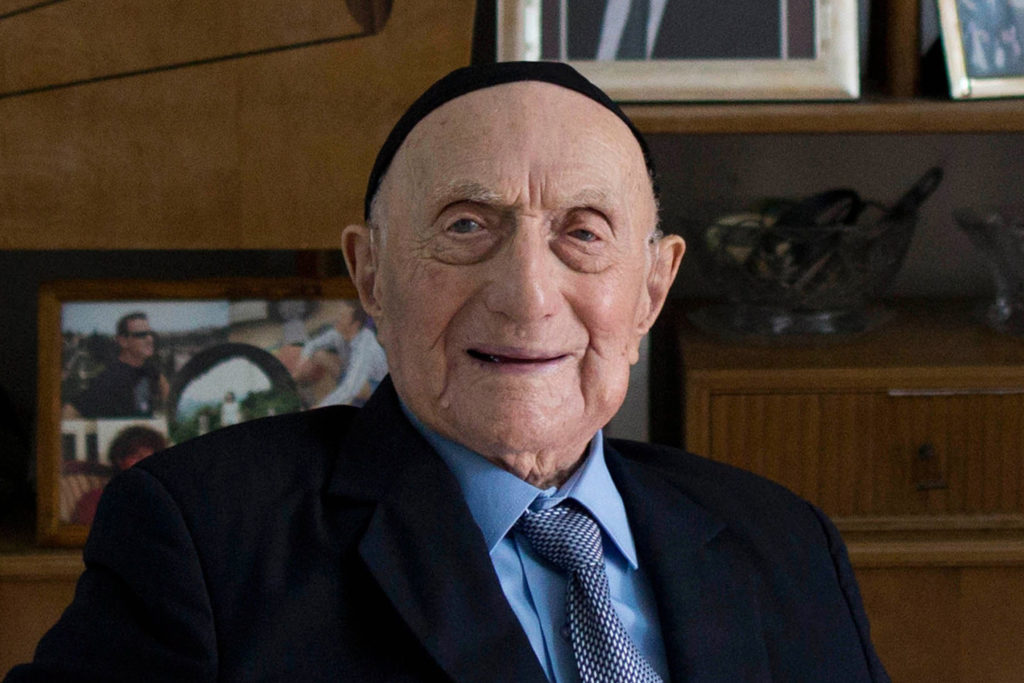FRESH AIR
Israeli secrets of longevity
August 17, 2017 | Sharyn Mittelman

Israel was home to the world’s oldest living man, Israel Kristal, who passed away on Friday August 11 aged 113 years and 330 days.
Mr Kristal was a Holocaust survivor who was born in Poland on 15 September 1903. He was sent to the Auschwitz death camp, and his first wife, two children and other family members were killed by the Nazis. Mr Kristal married again after the war and moved to Israel in 1950.
Last year, the Guinness World Records recognised Mr Kristal as the world’s oldest living man – he was 112 years and 178 days old at that time.
The secret to Mr Kristal’s longevity is a mystery – but it could possibly be Israel itself.
Despite the hardships faced by Israelis including the threat of terrorism and conflict, life expectancy in Israel is one of the highest in the world. Using the latest World Health Organisation figures, Israel is ranked eight in the world in life expectancy, at 82.5 averaged between men and women (that is just a few places behind Australia at 82.8).
That number is even more surprising than it looks. Research has generally shown that factors influencing a country’s longevity statistics include wealth, education, economic inequality, demographics and health characteristics, such as a good health system, nutrition and lifestyle.
The Taub Centre for Social Policy Studies in Israel, an independent research institute which examines trends affecting Israel’s population, has looked at some modelling which attempts to predict longevity in a country based on those characteristics. Under those models, Israel looks truly anomalous, particularly with respect to its male population. Men in Israel live much longer than that modelling would predict – 80.6 years, which makes Israeli men the fifth longest lived in the world overall (though the Taub Centre used 2013 data for their analysis, giving a slightly lower figure of 80.2 years).
The Center concluded “After analyzing over 170 countries, we found that life expectancy [among men] in Israel is 7.2 years greater than would be expected.” This makes the Israeli deviation from what the longevity model based on wealth, education, etc. would predict easily the largest in the developed world. So the Taub Center set out to figure out why Israeli men live so much longer than expected.
While there is no single explanation, they concluded that 3.6 years, “may stem from Israel’s mandatory military service and the improved physical fitness it brings.” Looking at other countries with mandatory military service, they saw apparent statistical effects on longevity in all of them, with the length of the service correlated with the impact of the effects. Israel, with its three years of service for men, and mandatory reserve duty of a few weeks a years – often up until the age of 54, seems to have gained maximum benefit from this effect.
Of course, Israel’s high longevity also bring challenges – such as an ageing Israeli population. According to the Taub Center senior citizens in Israel are expected to double from around 610,000 today to around 1.24 million by 2035, while the rest of the population is expected to grow by around 31%.
The ageing population could also have an impact by shrinking the proportion of the working-age individuals (ages 25 to 64) in the population as a whole. The Taub Center notes, “A relatively smaller workforce supporting a growing elderly population is likely to affect economic growth.”
However, despite this ageing population, Israel may have less of a problem in this respect than some other nations because fertility rates among Israeli women are very high compared with other OECD countries – 3.1 children per Israeli woman in 2015.
For more information on these interesting Israeli population trends and research into them from the Taub Center, click here.
Sharyn Mittelman
Tags: Israel
RELATED ARTICLES

Enormous hope that Iran is being liberated: Colin Rubenstein on Sky News

He survived Bondi. Now he’s fighting back: Arsen Ostrovsky addresses AIPAC conference





















